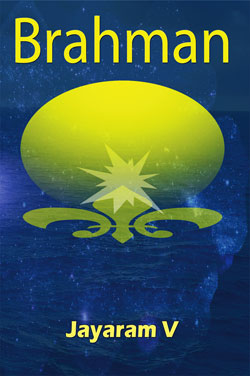
Book Details
ISBN/SKU: 193576005X
ISBN Complete: 978-1935760054
Book Type: B&W 6 x 9 x 0.4 in
Page Count: 182
Edition: First
Yr. of Pub.: 2010
Spine Width: 0.4188000000
Printed in: USA
Max Retail Price: $25.00
US Sale Price:
Click Here to Know
What this Book is About?
This book contains 25 informative and well researched articles
about the meaning and significance of Brahman, the highest God
of Hinduism. It explains his various aspects and importance
in the development of Vedic thought and the philosophy of the
Upanishads, the nature of Self, the nature of creation, and
the relationship between Brahman, the universal Self and Atman,
the individual Self. There is also a glossary of Brahman and
related words and bibliography.
Brahman is the highest
God of Hinduism who is worshipped in various forms but not directly.
He is the God of gods, the Supreme Self, Creator, preserver
and Destroyer. Brahma Vishnu Siva are His names only. Many Hindus
even the most serious practitioners of Hinduism do not know
about Brahman. For the first time in the history of Hinduism
there is a book exclusively devoted to Brahman. This book is
the result of an extensive research on the subject of Brahman.
This book is unique. You will not find another with this much
information on Brahman.
Why you should read this book
After reading this book, you will be surprised to know how
much you do not know about the mystery and history associated
with this highest Deity of Sanatana Dharma. You will be introduced
to many important concepts associated him such as the following.
1. Why Brahman is equated with the Vedas. 2. Why sacrifices
are important in Hinduism. 3. Why sounds carry such importance
in the Vedas and why Brahman is equated with sounds. 4. Brahman
in relation to other gods of Hinduism. 5. Why food is offered
in the Vedic sacrifices. 6. The real and hidden meaning of Brahman.
7. The ritual Brahman we do not know. 8. Why it is not possible
to know Barman intellectually. 9. Why Brahman is not worshipped
in the temples directly. 10. The various Brahma Vidyas and their
significance. 11. The positive and negative aspects and descriptions
of Brahman. 12. The various ways in which seers worshipped Brahman
in the ancient times. 13. Brahmopasana, how you may worship
Brahman as a personal God. 14. Distinction between Brahman and
Brahma Prajapati. 15. Why the worship of Brahma in temples declined.
16. class warfare between priests and warrior class and its
historic significance. 17. The secrets of Nidhidhyasana, the
contemplation of Brahman. 18. The significance and symbolism
of Brahman priest in Vedic sacrifices. 19. Aspects of Brahman.
20. How the concept of God and elements of monotheism found
their way into Hinduism. And much more!
To Order your Copy please click here.
Table of Contents
Contents - Author’s Note
Brahman, in the Vedic Tradition
Brahman as Power and Potency
The Symbolism of Food -
The Ritual Brahman We Have Forgotten
I Know Him and I Know
Him Not
Thou Art That
The Creator and the Created
Brahman as the Sacred Sound
Brahman in Temple Worship
Brahmavidays – Ways to Realize Brahman
The Creator God
of the Upanishads
The Attributes of Brahman
Brahmopasana
– The Paths To Liberation
Brahman as Isvara, the Personal
God
Brahman and Brahma Prajapati
Nidhidhyasana – The
Contemplation of Brahman
Brahman and the Brahman Priest
Difficulties in Knowing Brahman
Aspects of Brahman
Hinduism and the Belief in one God
Elements of Monotheism
in Early Vedic Tradition
The Paradox of Knowing Brahman
Brahman and Atman, the Individual Self
Bhagavan – The
Glorious God
Brahman in Advaita and Dvaita Schools
The
Glossary of Brahma (n) and Related Words
Bibliography.
Author's Note (An Excerpt)
If the Vedas are the heart of Hinduism, Brahman is the heart
and soul of the Vedas. This book is a theistic representation
of the highest God of Hinduism, Brahman, based on my study and
understanding of the Samhitas, the Upanishads and various schools
of Hindu philosophy. Brahman is not God in the traditional sense.
To describe Him as God from the narrow and simplistic perspective
of a religious dogma is to diminish His immensity and unconditional
universality. Nor is He a mere Creator in the traditional sense
of a magician or a miracle worker. He does not entirely fit
into the traditional dualistic views of God with which we are
familiar. He reveals Himself to the extent you unwind yourself.
He manifests when you disappear into yourself. He is the ultimate
and absolute principle, who is the source of all sources. He
is the God of gods and creator of the creator gods. He is the
mysterious force that moves everything, yet remains incognito.
Our words are inadequate to describe Him and our intellect is
insufficient to understand Him. Although He is the highest God
of Hinduism, He is relatively unknown and rarely spoken about
except in spiritual circles as the inmost Self or the universal
Self. The Vedas are all about Brahman. The knowledge of the
Vedas is traditionally deemed the knowledge of Brahman. Its
secrets are hidden in the subtle nuances of sounds coming from
the heavens rather than the intellect of the human minds. Hidden
within the Vedas are the mystic sounds filled with the power
and presence of Brahman. However, few people know that the Vedas
are not about gods but about Brahman. They do not know that
the structure of the Vedas is consistent with the Vedic worldview,
which revolves around Brahman and in which there is an equal
emphasis on balance, order and the need to pursue both material
and spiritual goals. I hope from this work the readers will
get a glimpse of the supreme Brahman and His importance in the
continuity of the eternal tradition we know as Hinduism. From
Brahman, by Jayaram.

